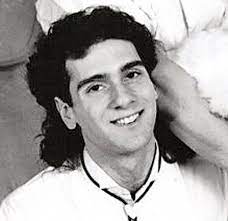Lou's Views : #bankadelic : #journalism : #qwoted : #media : #LouCarlozo
Dildos, mullets, pink guitars and the world’s worst soccer coach: How I broke into journalism

Once I rose to a certain level of experience and prominence at the Chicago Tribune, higher ups asked me to speak to students. I never demurred—until the day they requested that I share how I entered the field.
My answer came quicker than a “no comment”: “I don’t think I’m the guy you want doing this.” I told them my start was far from traditional. But before I could explain why, they booked me. Sensing I had no choice, I said OK … while I thought to myself, “Oh no”
As a dozen well-heeled collegiate superstars filed into a meeting room, I considered making something up. You know: “I’d wanted to be a journalist since I was 5 and saw my first episode of ‘Meet The Press.’ I started a neighborhood newspaper at age 8, wrote fan letters to Bob Woodward and became sports editor at Happy High School in my sophomore year.”
In fact, my Trib colleague shared a story pretty much like that. Oh, how badly I wanted to fabricate. But as journalists can get in huge trouble for lying—and lose their jobs if it’s in print—I told the actual story. As I alluded to briefly in last week’s column, I had zero experience when I sought my first journalism job at 25. At the Philadelphia Inquirer. Then referred to as “The Pulitzer Factory.”
Here’s the rest:
“I’d just been fired from a waiting tables at a Bennigan’s because my hair was too long. I had a mullet and played a Pepto Bismol-pink guitar in a South Jersey rock band. My hair was almost as tall as a bouffant. So really, I was looking for a job where I wouldn’t have to starve or cut my precious locks.
“I looked everywhere: music stores, bowling alleys, the local supermarket where they already had enough bag boys. Then I remembered that the ex-lead guitar player in my band was also an English major in college. He had a job writing for the local newspaper. Trouble was, it was really a bureau for one of the nation’s best papers. And as for the guitar player, I hadn’t spoken to him since kicked him out of my band.
“But he didn’t hang up and a week later I had an interview at the Inquirer, me and my long-ass hair. I had no clips to show; just two papers I’d written in college and a music magazine where I’d just done a guest editing stint. It looked like something printed in a junior high school basement.
“The editor was a genteel fellow with a stentorian voice and a silver mustache straight from the 1890s. He looked at my resume. Two waiter jobs, one at Pizza Hut. Then he stared me down. ‘Let’s get this straight. You have no experience and you haven’t written for a paper since college?’ I nodded my head. It was a two-part question, which allowed me to dodge the fact I hadn’t written for a paper since HIGH SCHOOL.
“He began to thumb through what writings I had. When he opened the music magazine, I had a moment worthy of a triple dry heave. One of my bylines was about a woman named Reesa who played slide guitar with a dildo. But he didn’t make it that far; only to the inside cover and my editor’s letter, where I’d written a moving or mawkish piece about the promise of Philly’s music scene.
“And the deal was this: It was August and three of his stringers had just left that week to go back to school. He needed somebody bad. Really bad. Plus, he was a sucker for losers. I later learned he was also a boys’ soccer coach whose team hadn’t won a game in more than two years.”
For the sake of time, I left out a lot of details—like, how I didn’t know what a nut graf was (for 18 months, no less) and almost got fired three weeks into the gig. And how my eventual mentor told me: “Lou, if I’d have been there and a German shepherd walked in with a ‘reporter’ sign around its neck, I would’ve hired them over you.”
The kids said nothing. I can only guess what they thought: “Liar.” “Idiot.” “Space goon endowed with galactic amounts of luck.” Here’s what I thought: “Well, maybe I was entertaining. And maybe one of these students secretly feels like don’t they have a shot at this career. That they’re an imposter. Like I was. That’s who I did this for. If I can make it, they can make it, too.”
Then, much like Mr. Silver Mustache, my colleague stared at me. She was a respected journalist, the kind I never thought I could be. I felt the ice floe in my self-esteem break when she smiled and said:
“Lou! I had no idea. My story is so boring! I wish it were as colorful as yours.”
How could I forget? Every journalist loves a good story.
Lou Carlozo did go on to be a Pulitzer Prize finalist, syndicated columnist and serious journalist, dunking his head in a vat of Twinkie cream for one major assignment. He is Qwoted’s Editor In Chief: lou@qwoted.com
This week on Lou Carlozo’s Bankadelic podcast: Kathleen Craig of HT Mobile Apps discusses “Financial Literacy–Now!”
POPULAR POSTS
